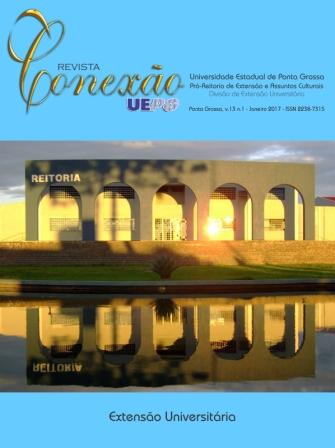“NÓS PROPOMOS”: THE MULTIPLICITY OF ACTORS AND THE DIVERSITY IN CITIZENSHIP EDUCATION - 10.5212/Rev.Conexao.v.13.i1.0007
DOI:
https://doi.org/10.5212/Rev.Conexao.v.13.i1.0007Keywords:
Nós Propomos, university extension, citizenship education.Abstract
This study aimed to examine the multiplicity of actors involved in the dynamic of the project “Nós Propomos” (We Offer), considering the respect for diversity due to the range of integrative and thematic actions undertaken between university and public high schools of the state of Tocantins. The qualitative and quantitative methodology applied to the empirical study analyzed the performance of the ones in charge of the integrative and thematic actions of the project, consisted of students and teachers of high school and undergraduate and postgraduate courses, to create a structural basis to transmit knowledge production. As a result, it integrated university and high school communities in the production and transmission of knowledge. It was possible to conclude that the project was successful at establishing a relationship of multiplicity and diversity and at promoting a breakthrough in educational technology.
Downloads
References
ARAGÃO, A. Ensaio sobre a construção europeia e a reinvenção da democracia, a propósito dos diálogos com os cidadãos. In: CORREIA, Fernando Alves et al. (org.). Estudos em homenagem a António Barbosa Melo. Coimbra: Almedina,2013, p. 17-34.
Brasil. Casa Civil. Subchefia para Assuntos Jurídicos. Lei n. 10.257, de 10 de julho de 2001. Regulamenta os arts. 182 e 183 da Constituição Federal, estabelece diretrizes gerais da política urbana e dá outras providências. Diário Oficial da União. Brasília, 10 jul. 2001. Disponível em: <http://www.planalto.gov.br/ccivil_03/leis/LEIS_2001/L10257.htm>. Acesso em: 19 out. 2016.
______. Constituição da República Federativa do Brasil. Brasília: Senado Federal, 1988.
BIGGS, S. D. Resource-poor farmer participation in research: a synthesis of experiences from nine National Agricultural Research Systems.OFCOR –Comparative Study Paper, The Hague, n. 3,jun. 1989, p. 1-37. Disponívelem: <http://cdm15738.contentdm.oclc.org/cdm/ref/collection/p15738coll11/id/92>. Acesso em: 10 out. 2016.
CAVALCANTI, C. (org.). Desenvolvimento e natureza: Estudos para uma sociedade sustentável. Recife: INPSO/FUNDAJ – Instituto de Pesquisas Sociais, Fundação Joaquim Nabuco; Ministério de Educação, 1994. Disponível em: <http://xa.yimg.com/kq/groups/19711007/678619687/name/livro_desenvolvimento_natureza. pdf#page=14>. Acessoem: 3 abr. 2016.
CLEAVER, F. Institutions, Agency and the Limitations of Participatory Approaches to Development. In: COOKE, B.; KOTHARI, U. Participation, The New Tirany. London: Zed Books, 2001.
COOKE, B.; KOTHARI, U. Participation, The New Tirany. London: Zed Books, 2001.
DEMO, P. Participação é conquista: noções de política social participativa. São Paulo: Cortez, 1993.
FURTADO, C.Brasil, a Construção Interrompida. Rio de Janeiro: Paz e Terra, 1992.
LAFAYE, J. A literatura e a vida intelectual na América Espanhola Colonial. In: BETHELL, Leslie (Org.). História da América Latina. Vol. 2. São Paulo: EDUSP, 1999.
LYRA, R. P. A ouvidoria na esfera pública brasileira. João Pessoas: Universitária, UFPB, 2000.
MARTELETO, R. M.; SILVA, A.B.O. Redes e capital social: o enfoque da informação para o desenvolvimento local. CI, INF, Brasília, v. 33. N. 3, p. 41-49, set./dez., 2004. Disponível em: <http://www.scielo.br/pdf/ci/v33n3/a06v33n3.pdf>. Acesso em: 5 out. 2016.
MIRRA, E.A Ciência que sonha e o verso que investiga. São Paulo: Papagaio, 2009.
MARIÁTEGUI, J. C.Ensayos de Interpretación de laRealidad Peruana.44. ed. Lima: Amauta, 1981.
MINTO, L. W.As reformas do ensino superior no Brasil: o público e o privado em questão. Campinas: Autores Associados, 2006.
NOGUEIRA, M. das D. P. Políticas da Extensão Universitária Brasileira. Belo Horizonte: Ed. UFMG, 2005.
PITA, C. et al. Stakeholders' participation in the fisheries management decision-making process: Fishers' perceptions of participation. Marine Policy, v. 34,n. 5, p. 1093-1102, set. 2010.
REDCLIFT, M. Sustainable development and popular participation: a framework for analysis. In: GHAI, D.; VIVIAN, J.M., ed. Grassroots-environmental action: people participation in sustainable development.Londres: Routledge, 1995, p. 23-77.
SANTOS, B. D. S. Presupuestacion Participativa Hacia Una Democracia Redistributiva. Ruralter, Coimbra, v. 1, p. 107-156, 1998.
SANTOS, B. S.; AVRITZER, L. Democratizar a democracia – os caminhos da democracia participativa. In:SANTOS, B. S. (Org.). Para ampliar o cânone democrático. Porto: Afrontamento, 2003.
SOARES, L. T. Prefácio: Direitos humanos políticas públicas e extensão universitária. In: FREIRE, S. de M. (Org.). Direitos humanos, violência e pobreza na América Latina contemporânea. Rio de Janeiro: Letra e Imagem, 2007, p.9-12.
WERFFORT, F. Qual democracia? São Paulo: Companhia das Letras, 1992.
Downloads
Published
Issue
Section
License
a) Authors retain copyright and grant the journal right of first publication with the work simultaneously licensed under a Creative Commons Attribution License that allows others to share the work with an acknowledgement of the work's authorship and initial publication in this journal.
b) By submitting an article to the Revista Conexão UEPG and having it approved, the authors agree to assign, without compensation, the following rights to the Journal: the rights of first publication and the rights to redistribute the article and its metadata to the indexing and reference services that the editors deem appropriate.
c) Readers are free to transfer, print out and use the articles published in the Journal, as long as there is always explicit mention to the author(s) and to the Revista Conexão UEPG and as long as there is no alteration of the original work. Any other use of the texts needs to be approved by the author(s) and by the Journal.






